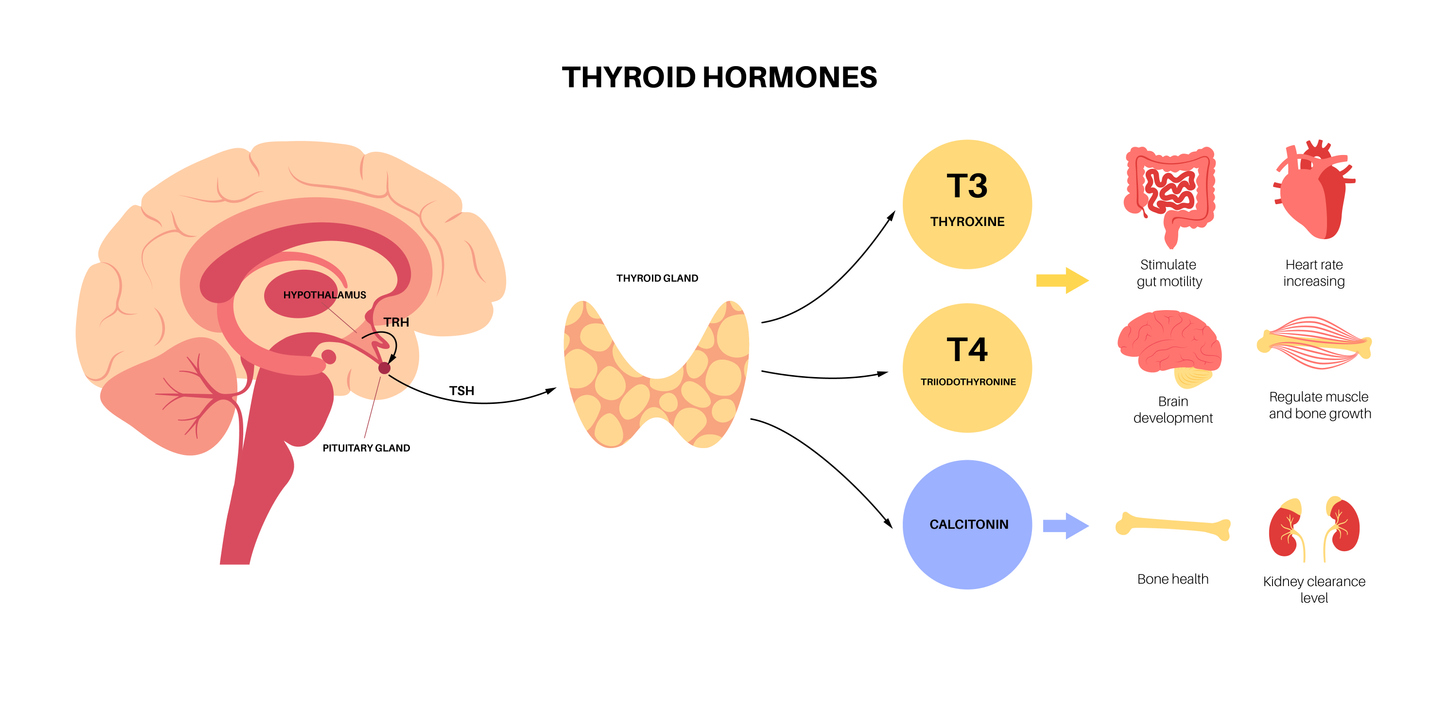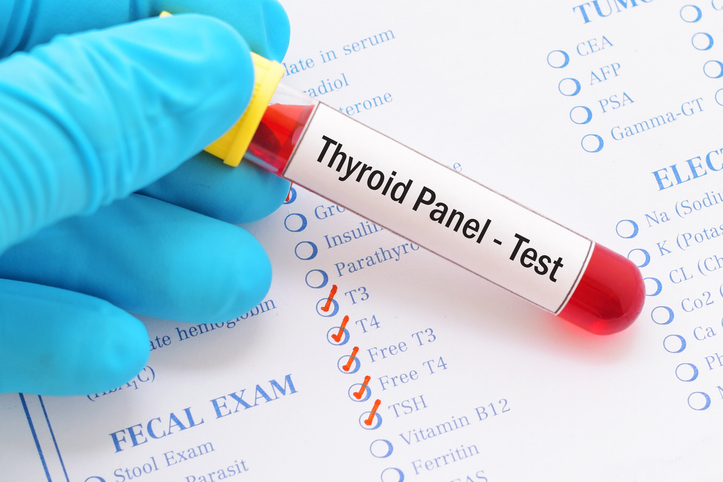Triiodothyronine (T3) – what do you need to know?
Triiodothyronine (T3) is a hormone secreted by the thyroid gland. It is a biologically active form of thyroid hormone that affects the proper functioning of our body. T3 regulates metabolic rate, body temperature, growth, cell development and many other processes. It is worth noting that T3 and T4 are the two main thyroid hormones. T3 is the active form, while T4 is the precursor to T3. TSH (thyroid stimulating hormone) is produced in the pituitary gland and influences the secretion of T3 and T4 by the thyroid gland.
Triiodothyronine (T3) characteristics
T3 is one of the most important thyroid hormones, especially in unborn children, during the development of the nervous and skeletal systems.
It influences key processes occurring in the human body, such as:
- water balance,
- energy transformations,
- metabolism of fats, proteins and carbohydrates
- functioning of the reproductive, digestive,
- circulatory and kidney systems.

Thyroid gland functions diagram. T3, T4 hormones and calcitonin production. Regulation of metabolic rate, heart, muscle and digestive system. Human endocrine system medical flat vector illustration.
When is T3 tested?
Most often, T3 is tested when thyroid disorders are suspected, i.e. hypothyroidism or hyperthyroidism. The test will be necessary when T4 and TSH levels are not sufficient to make a final diagnosis. Other indications include the occurrence of thyroid nodules, monitoring the treatment of thyroid diseases, incorrect TSH test results and diagnosis of thyrotoxicosis.

Blood sample with requisition form for thyroid panel test
How is the triiodothyronine (T3) test performed?
To be sure of the reliability of the test result, it is also necessary to measure fT3 (free hormones). More than 99% of the hormone is found in human blood, and the rest is scattered throughout the body. T3 is tested in two stages. The first step involves taking blood from an antecubital vein and extracting any additional components. Radiating antibodies are then introduced into the purified serum by combining T3 molecules. The level of triiodothyronine can be determined based on the emitted light intensity. Before the examination, you must not eat for at least 8 hours.
How to interpret the T3 test result?
The test result should be interpreted by a specialist, as it may be influenced by many factors, including medications taken by the patient, pregnancy, liver and kidney diseases. An increased level of triiodothyronine (T3) may indicate hyperthyroidism, nodular goiter or taking preparations containing T3. Too low a level may indicate hypothyroidism, Hashimoto’s disease or subacute thyroiditis.
Regulating thyroid function
The main products of the thyroid gland are thyroxine (T4) and triiodothyronine (T3). In the thyroid gland, they are produced by the transformation of a larger molecule – thyroglobulin. It, in turn, is stored inside the thyroid follicles, is located within the colloid and releases hormones after stimulation of the thyroid cells by TSH produced in the pituitary gland. Thyroid diseases generally result from excessive or insufficient production of hormones. Treatment of hypothyroidism almost always involves oral supplementation of synthetic thyroid hormones and the use of an appropriate diet. Hyperthyroidism can be treated pharmacologically, surgically or with the use of radioactive iodine. The type and duration of treatment are selected depending on the cause of the disease, age and health condition of the patient. People struggling with hypothyroidism most often use levothyroxine or liothyronine. In hyperthyroidism, thionamides and beta-blockers are used. For the thyroid gland to function properly, the T4 hormone must be converted into the active T3 hormone. This requires proper absorption of the drug by taking it properly. According to the leaflets, hormones should be taken at least 30 minutes before the first meal of the day, on an empty stomach.

Female doctor using ultrasound while examining man’s neck at medical clinic.
Fats and thyroid function
Fat is a macroelement that plays an extremely important role in thyroid diseases. It is responsible for regulating the activity of the hypothalamic-pituitary-thyroid axis and also influences the metabolism of T3 and T4 hormones in target cells. Therefore, you should not excessively limit fat in your diet when treating thyroid diseases. Otherwise, the functioning of the immune system may be impaired and the absorption of fat-soluble vitamins may be limited.

Inscription hashimoto with best nutritious food for healthy thyroid. Natural eating containing vitamins and minerals
Co-occurrence of diabetes with thyroid diseases
If diabetes and thyroid diseases coexist, the patient is more susceptible to cardiovascular diseases and their more severe course, which may even lead to death. Thyroid hormones affect all cells and tissues in the body. They also act on beta cells in the pancreas – they are then responsible for their proliferation and maturation. Triiodothyronine (T3) also influences insulin secretion and glucose uptake. Hormones also act in the liver, where they have an antagonistic effect on insulin. Hypothyroidism is associated with increased glucose absorption, which may lead to hypoglycemia. Hyperactivity, in turn, causes an increase in insulin demand and hyperglycemia.
Thyroid diseases and food intolerances
Autoimmune diseases tend to coexist with each other. You can also encounter chronic inflammation of the thyroid gland caused by food. This state of affairs is confirmed by an increase in the amount of so-called antithyroid antibodies. Then anti-TPO and anti-TG increases. The most common symptoms are lactose and gluten intolerance. The best method of treatment is to introduce periodic nutritional therapy, i.e. an elimination-rotation diet. This diet excludes inflammatory factors from food.
Growth hormones and thyroid hormones
The leaflets accompanying growth hormones clearly state that taking them increases the need for thyroid hormones. If the appropriate amount of T3 hormone is not provided, hypothyroidism may occur and the effect of growth hormone may be weakened. These hormones are partially dependent on each other. That’s why, before you start taking growth hormones, you should check your thyroid hormone levels and use T3 to regulate insulin levels.
Do you always need to use hormones to regulate your thyroid?
It is not always necessary to use hormones to regulate the thyroid. In some cases, dietary and lifestyle changes, such as adequate iodine and a healthy diet, can help keep your thyroid healthy. However, in cases of hypothyroidism or hyperthyroidism, and other serious diseases, the use of thyroid hormones may be necessary.
Triiodothyronine (T3) and sleep comfort
Triiodothyronine (T3) is a hormone necessary for the proper functioning of the body, but it must remain at the appropriate level. Its excess leads to disruption of metabolic processes and, as a result, may cause insomnia caused by psychomotor acceleration. T3 below normal is, in turn, a symptom of hypothyroidism, the characteristic symptom of which is excessive sleepiness and a feeling of lack of sleep in the morning. This may also increase the level of cortisol and at the same time reduce the level of melatonin, which plays a key role in the comfort of sleep. This state of affairs is also associated with a reduction in the level of somatotropin responsible for regeneration. All this has a negative impact on both physical and mental health. Going further, it can be said that these abnormalities have a significant impact on a person’s biopsychosocial functioning. Sleep apnea is more common with hypothyroidism. The optimal level of T3 is responsible for healthy and comfortable sleep ensuring proper rest.








